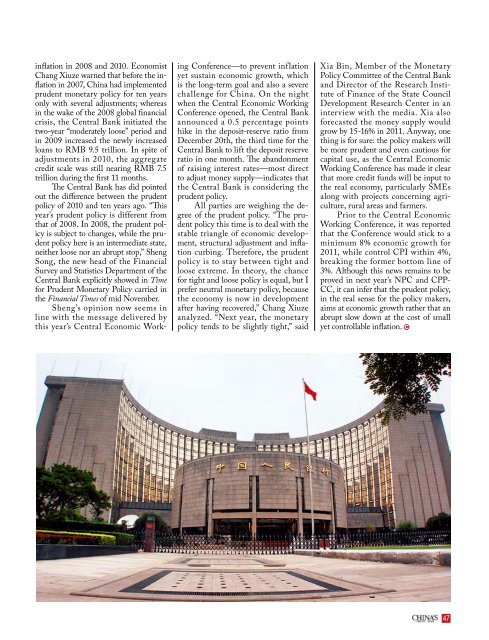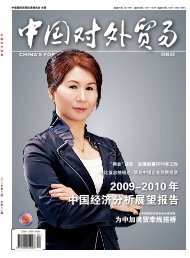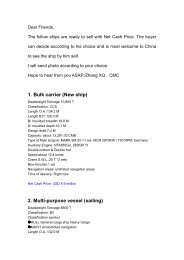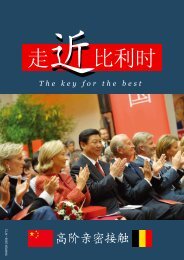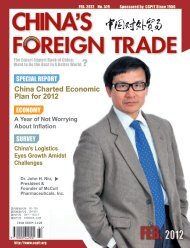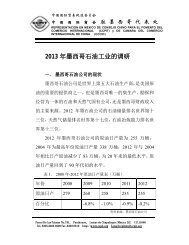Create successful ePaper yourself
Turn your PDF publications into a flip-book with our unique Google optimized e-Paper software.
inflation in 2008 and 2010. Economist<br />
Chang Xiuze warned that before the inflation<br />
in 2007, China had implemented<br />
prudent monetary policy for ten years<br />
only with several adjustments; whereas<br />
in the wake of the 2008 global financial<br />
crisis, the Central Bank initiated the<br />
two-year “moderately loose” period and<br />
in 2009 increased the newly increased<br />
loans to RMB 9.5 trillion. In spite of<br />
adjustments in 2010, the aggregate<br />
credit scale was still nearing RMB 7.5<br />
trillion during the first 11 months.<br />
The Central Bank has did pointed<br />
out the difference between the prudent<br />
policy of 2010 and ten years ago. “This<br />
year’s prudent policy is different from<br />
that of 2008. In 2008, the prudent policy<br />
is subject to changes, while the prudent<br />
policy here is an intermediate state,<br />
neither loose nor an abrupt stop,” Sheng<br />
Song, the new head of the Financial<br />
Survey and Statistics Department of the<br />
Central Bank explicitly showed in Time<br />
for Prudent Monetary Policy carried in<br />
the Financial Times of mid November.<br />
Sheng’s opinion now seems in<br />
line with the message delivered by<br />
this year’s Central Economic Working<br />
Conference—to prevent inflation<br />
yet sustain economic growth, which<br />
is the long-term goal and also a severe<br />
challenge for China. On the night<br />
when the Central Economic Working<br />
Conference opened, the Central Bank<br />
announced a 0.5 percentage points<br />
hike in the deposit-reserve ratio from<br />
December 20th, the third time for the<br />
Central Bank to lift the deposit reserve<br />
ratio in one month. The abandonment<br />
of raising interest rates—most direct<br />
to adjust money supply—indicates that<br />
the Central Bank is considering the<br />
prudent policy.<br />
All parties are weighing the degree<br />
of the prudent policy. “The prudent<br />
policy this time is to deal with the<br />
stable triangle of economic development,<br />
structural adjustment and inflation<br />
curbing. Therefore, the prudent<br />
policy is to stay between tight and<br />
loose extreme. In theory, the chance<br />
for tight and loose policy is equal, but I<br />
prefer neutral monetary policy, because<br />
the economy is now in development<br />
after having recovered,” Chang Xiuze<br />
analyzed. “Next year, the monetary<br />
policy tends to be slightly tight,” said<br />
Xia Bin, Member of the Monetary<br />
Policy Committee of the Central Bank<br />
and Director of the Research Institute<br />
of Finance of the State Council<br />
Development Research Center in an<br />
interview with the media. Xia also<br />
forecasted the money supply would<br />
grow by 15-16% in 2011. Anyway, one<br />
thing is for sure: the policy makers will<br />
be more prudent and even cautious for<br />
capital use, as the Central Economic<br />
Working Conference has made it clear<br />
that more credit funds will be input to<br />
the real economy, particularly SMEs<br />
along with projects concerning agriculture,<br />
rural areas and farmers.<br />
Prior to the Central Economic<br />
Working Conference, it was reported<br />
that the Conference would stick to a<br />
minimum 8% economic growth for<br />
2011, while control CPI within 4%,<br />
breaking the former bottom line of<br />
3%. Although this news remains to be<br />
proved in next year’s NPC and CPP-<br />
CC, it can infer that the prudent policy,<br />
in the real sense for the policy makers,<br />
aims at economic growth rather that an<br />
abrupt slow down at the cost of small<br />
yet controllable inflation.<br />
47


